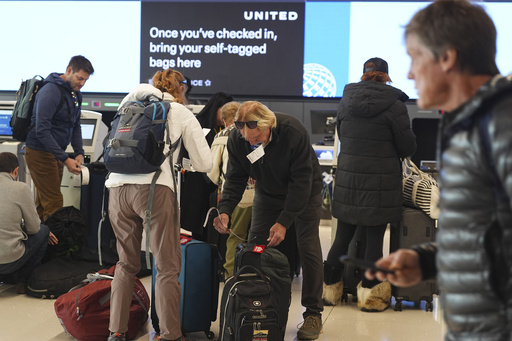
Drivers and airline passengers without festive sleighs are urged to get moving as the holiday travel season in the U.S. is set to break records once again.
According to AAA, over 119 million individuals are expected to travel at least 50 miles from home from Saturday until New Year’s Day, surpassing the previous record set in 2019. The weekends surrounding Christmas are predicted to be especially busy for both roadways and airports.
Meanwhile, Airlines for America anticipates that U.S. airlines will accommodate 54 million passengers during a 19-day stretch, counting from last Thursday until January 6, representing a 6% increase compared to last year.
The looming possibility of a government shutdown beginning Saturday might not immediately impact flights or airport operations given the proximity to the holiday season; however, prolonged shutdowns could lead to delays and disruptions.
As for the busiest travel days, airlines are preparing for peak traffic on Fridays, Sundays, and the days just after Christmas. In contrast, Christmas Day and New Year’s Day are expected to have lighter flight activity. Historically, Thanksgiving Day has shown to be the least busy for air travel in comparison.
The Transportation Security Administration (TSA) projects screening around 40 million holiday travelers through January 2.
AAA reports that nearly 90% of Americans opting to travel during the holidays will be on the road, emphasizing the preference for driving over flying.
“Airline travel is seeing a significant surge at the moment, but driving remains the most common choice for holiday travel,” stated AAA spokesperson Aixa Diaz.
Current gasoline prices are comparable to those from last year, with the national average at $3.05 per gallon, a decrease from the $3.08 recorded the previous year. For electric vehicle users, the cost per kilowatt-hour hovers just under 35 cents, varying by region.
Travel time on highways during this holiday season could increase by up to 30%, with the heaviest congestion expected on Sundays. INRIX has identified cities like Boston, New York City, Seattle, and Washington, D.C. as likely hotspots for delays.
The extended holiday travel period generally leads to smaller peak days compared to Thanksgiving, yet the continuous nature of packed travel days can stress flight crews. Adverse weather conditions or technical glitches can create cascading disruptions similar to what transpired last December when Southwest Airlines faced a plight that stranded millions of passengers.
While cancellations can disrupt holiday plans, the situation becomes more complex for travelers on smaller airlines that lack ample rebooking options. Major carriers like American, Delta, and United have interline agreements allowing them to accommodate stranded passengers more easily.
This holiday season marks the first under a new Transportation Department rule mandating automatic cash refunds for significantly delayed or canceled flights. Passengers, however, have the option to request rebooking, generally a preferred choice during peak travel times, especially as last-minute ticket prices tend to be exorbitantly high.
“Rebooking can save travelers from the stress of sudden fare hikes,” explained travel expert Sally French from a consumer advocacy firm.
For budget airline passengers facing cancellations, options may be limited; these travelers might wait days for the next available flight.
Some airlines are leveraging the new rule’s criteria defining a significant delay differently than before, which could impact reimbursements for certain cancellations as perceived by consumers.
Furthermore, delayed flights often come with the risk of lost luggage. Should travelers experience this, they should report it to the airline and inquire about coverage.
In the event of a government shutdown, which may occur without continued funding support by Congress, essential transportation personnel, including TSA associates, air traffic controllers, and customs officers, would still report to duty without pay. Extended shutdowns could lead to increased absenteeism, resulting in longer queues and potential delays at airports, as noted by TSA spokesperson Carter Langston.
Regardless, AAA advises travelers to forge ahead with their plans even if a shutdown occurs, as airport operations are likely to continue, albeit at a slower pace.
As travelers look toward future trips, November data reflect a 4.7% rise in airline fares year-over-year. Thus, planning early, particularly during the months of January and February, is encouraged for trips in 2025. Popular destinations and inclined travelers should begin considerations early in the year to secure favorable fares and travel arrangements.
According to Laura Motta, a travel editor, “Those planning springtime trips should start thinking ahead as the demand for travel continues to escalate.”
